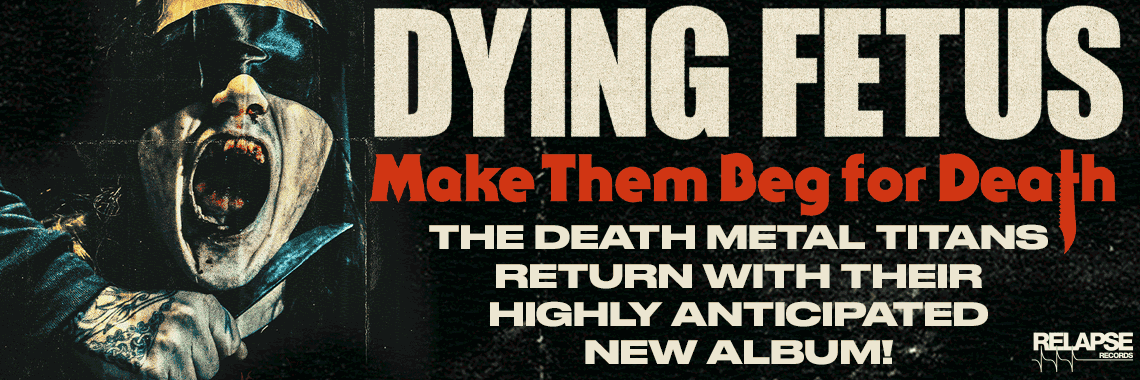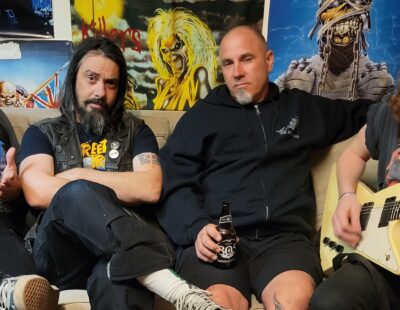What with Neurot reissuing Neurosis’ Sovereign EP, we thought it was probably no better time to celebrate how great they are. Currently working on the follow-up to 2007’s Given to the Rising, work that we most definitely won’t see ’til 2012, Scott Kelly’s is one of the bona-fide ayatollahs of giganto-riff. Like, him and Steve Von Till are authorized dealers of apocalypse-grade guitar, and Kelly’s work both with Neurosis and Shrinebuilder is kinda underrated in the muso Berkley Tech set. C’mon, the granola-crunchers can keep their hemi-demi-semi-quavers until they can come up with something like this.
https://www.youtube.com/watch?v=fmdmnnv2NkY&feature=related
Or indeed this…
https://www.youtube.com/watch?v=_4tGIyBpJ2c
Anyways, the following is some hitherto unpublished extracts from an interview from a wee while back.
You have a particulalry gnarly ensemble of riffs, which in particular would you say is like a signature riff?
Scott Kelly: “We had a couple in the Shrinebuilder practice that were pretty great, some of the newer ones. That is what I do, I’m not really a lead guitar player. I can’t really play that, it doesn’t feel right. I do the riff at the end of “To The Wind”, on the last Neurosis record. Riffs are weird. I mean, that’s a pretty busy riff, there’s a lot of action to it. Riffs to me are kinda like the foundation, the emotion of the song. It definitely can be about as simple as you can imagine, it could be one chord or one note played in the one rhythmical pattern for it to work. When you think about riffs, for me, the two people who come to mind are Iommi and Jimmy Page and then I start thinking about why and I think it’s because they can play riffs that can move you so much you feel the depths of it immediately when it’s right. I know through the course of my writing I’ve lost a lot of riffs because I haven’t been able to record them or anything at the time that I wrote them. I realise I’ve got the same chords, I’m putting them in the same sequence, like there’s this little tiny hitch somewhere that I’m not remembering, I’m not able to find again and that’s what makes it could. That’s the part of writing music that I really enjoy and trip on.”
The riff is everything…
SK: “Yeah, it is for sure. I definitely don’t like any music that doesn’t have any riffs, unless it’s purposely devoid of them in some sort of jazz fashion or just a drone/noise approach, I can definitely appreciate that. Like it’s gotta have that riff. That’s the stuff that moves me the most. Jesus, that’s why I own every record Wino ever wrote. He just writes riffs, and playing in a band with him he shows up with these things to practice and it’s like, ‘God, that’s amazing.’”
How would you describe your style?
SK: “My riffs are kinda an Iommi approach, just straight power; those guys will do some really intricate guitar work to create these lush riffs. We do a bit more of that in Neurosis ‘cos me and Steve tend to play that way. Steve and I together can create a sort of third element. Those guys together, though, they can both play really good. I really am not anything technical. I have nothing to do with it; I’m just straight power. I can so some quiet, I can do some subtle and I can do some minimal but the intricate stuff just doesn’t happen, I just don’t have the hands for it.”
It’s always useful to know your limitations.
SK:“Yup, and surround yourself with people who can play their ass off. I’ve been really good at that.”
When we’re talking about riffs, the conversation always turns to Melvins. Buzz is really an auteur when it comes to playing.
SK: Some of their best riffs they do like one and a half times and then their gone. They just come out and hit you. But there’s that song on Bullhead where Buzz is just doing like an open high E string and— holy shit, [screams in the background] there’s a baby running about with a screwdriver in her mouth. That’s probably the name of the song. God, I don’t know man. They have so many. I tell you, the one that’s the best is, I believe, the last song on Lysol; and of course it’s a total pain in the ass to check on your CD ‘cos it’s all one track.”
They’re so awkward, they weird a lot of people out.
SK: “They’re antisocial. It makes you glad that they exist and wonder what your life would be like if you didn’t know they existed. We’ve been tripping on them for our entire existence. When our band started they had broke down in the parking lot of the warehouse we were living in, and stayed next door for a few days. We were about three/four months into Neurosis and already on our Amebix and Celtic Frost trip and then those guys showed up.”
Amebix have been a huge influence on you.
SK: “It’s kinda like that NWOBHM approach to guitar playing but the way that they did it was so fucked up it was unrecognisable. Yeah, I guess if they’d done it with Marshall stacks, Les Pauls and were like trained metal guitar players it would have sounded like that. But they weren’t. They were just half in and out of squats and recording records with whatever they could get their hands on. They did that album in like a day so it comes off really raw with this energy to it. That was, Amebix, was like finding a fucking grail for us, honestly. The combination of what they were doing was/remains powerful. Tom G. Warrior has some amazing riffs. Morbid Tales has some of toughest, meatiest sounding shit ever. The weird thing is that I don’t remember how I found Celtic Frost, and I’m always really aware of that. I do know that my Celtic Frost record got my roommate out of his room with some Amebix and I remember that. That record still to this day, I’ve probably never played a record louder than I play that record. When I need to wake up, when I’m pissed off or whatever, that’s the record I turn to. To be honest I usually go straight past “Into The Crypt Of Rays” and get to that part where it just rips your head off. I was asking our sound guy, Dave Clark, why the hell that record sounds like that. It’s interesting, the bass is so loud in the mix but the guitars drive it so strong. I dunno, that record’s amazing.”
How does the writing process for Shrinebuilder differ from Neurosis?
SK: Shrinebuilder is different. For the first one, we just went in and we had to get this fucking record done. We had the songs, we were going on a lot of belief that we could just go in there and do it, which we did. But in hindsight it’s definitely not the way we’d prefer to do records. But we don’t live in the same towns, we’ve got different schedules and a bunch of kids. I’ve got a regular day job as well so it’s difficult to make time to really work on stuff. I know this is well publicised but I can’t emphasise it enough; we had played together for literally one hour before we recorded, it was the only time the four of us had been in a room together actually working on shit—which wasn’t working at all, it was just going over the songs. The album’s 40 minutes long so you could imagine that hour we just set up and played our 40 minutes of material, went home and went to the studio.”
You got to spend some more time together after that Volcano that all but grounded Roadburn 2010.
SK: “I thought there’s no point in getting to upset there’s not a god damn thing you can do. I have never, ever had that sort of thing happen to me in any situation except for the earthquake in the Bay Area. I’ve never found anything that I couldn’t figure my way through. You go through life trials, loss, all kinds of horrible shit; there’s always a way to fight through it. We started working on this stuff with all this in mind and it came through; the intensity of the situation and the trials we had to go through as a group. We came up with some stuff there that was just really intense and I am just so totally excited about the second album. I tell you right now, the second album is well going to eclipse the first one.”
Maybe that volcano will be a blessing in disguise
SK: “I told Wino that in ten years from now we’ll put out an album with a volcano on the cover and it’ll be called Thank You. I mean, we are supposed to work on music and who the fuck cares about anything else or than the music and the riffs and the belief that the music is the vehicle, the door to a better fucking world/life/viewpoint/whatever.”






